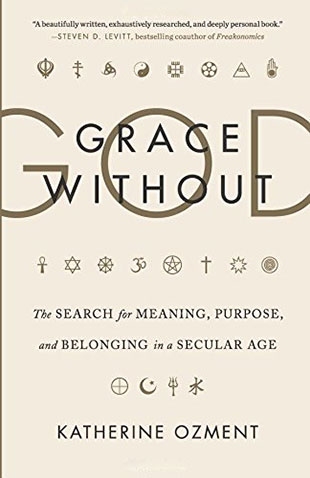Katherine Ozment is an award-winning journalist who has worked in publishing for more than 25 years. Her personal essays and reported articles have appeared in National Geographic, The New York Times, Boston, Salon, and Fitness.
Ozment was raised Presbyterian and her husband was brought up as a Jew. Both of them had moved beyond religion by the time their children were born. Grace Without God was birthed by a question about their family's religion posed by her eight-year-old son: "What are we?" Ozment responded: "We're nothing."
In the back of her mind the author knew that she had received some good and valuable things from religion; namely community, a sense of belonging, and rituals. So she broadened her question: "Could my family and I find valid alternatives to all the good that religion gives?"
This adventuresome journalist hits the road and visits Catholic church services, a Buddhist retreat, and Unitarian gatherings. She interviews religious and community leaders and both academics and lay leaders. Running as a thread through these pages is the question troubling Ozment most of all: "How do we create a sense of meaning and purpose without religion?"
She identifies some of the challenges facing those who have left religious communities as finding ways of coming together for moral action; being religiously literate; and maintaining morality without a map. These are important needs in the lives of post-religious folk.
When the author asks Robert Putnam at Darwin's Café in Cambridge if secular people could form communities that would ever rival religious ones, he answers: "Can there be a church of the Nones? We won't know for another three hundred years.
Phil Zuckerman, the secular studies professor from Pitzer College in Claremont, California, outlines for her the foundational beliefs of secular humanism. He says she should tell her children, "We believe in making the world a better place, we believe in evidence over faith, we believe in reason as a way to address problems, we believe ih helping others because that makes the world better for everybody."
Ozment notes that in addition to their search for meaning and purpose, these seekers yearn to create new and relevant rituals as pockets of order and safety in the world. For example, such rituals could help people deal with death and grief without relying upon traditional God talk. A new movement called Death Cafes has come about, and it signals an urge to confront impermanence and the end of life without conventional ideas about judgment, Heaven, or Hell.
Ozment ends this timely and creative work with a mind and soul-stretching collection of resources for those charting their own path to grace without God.
